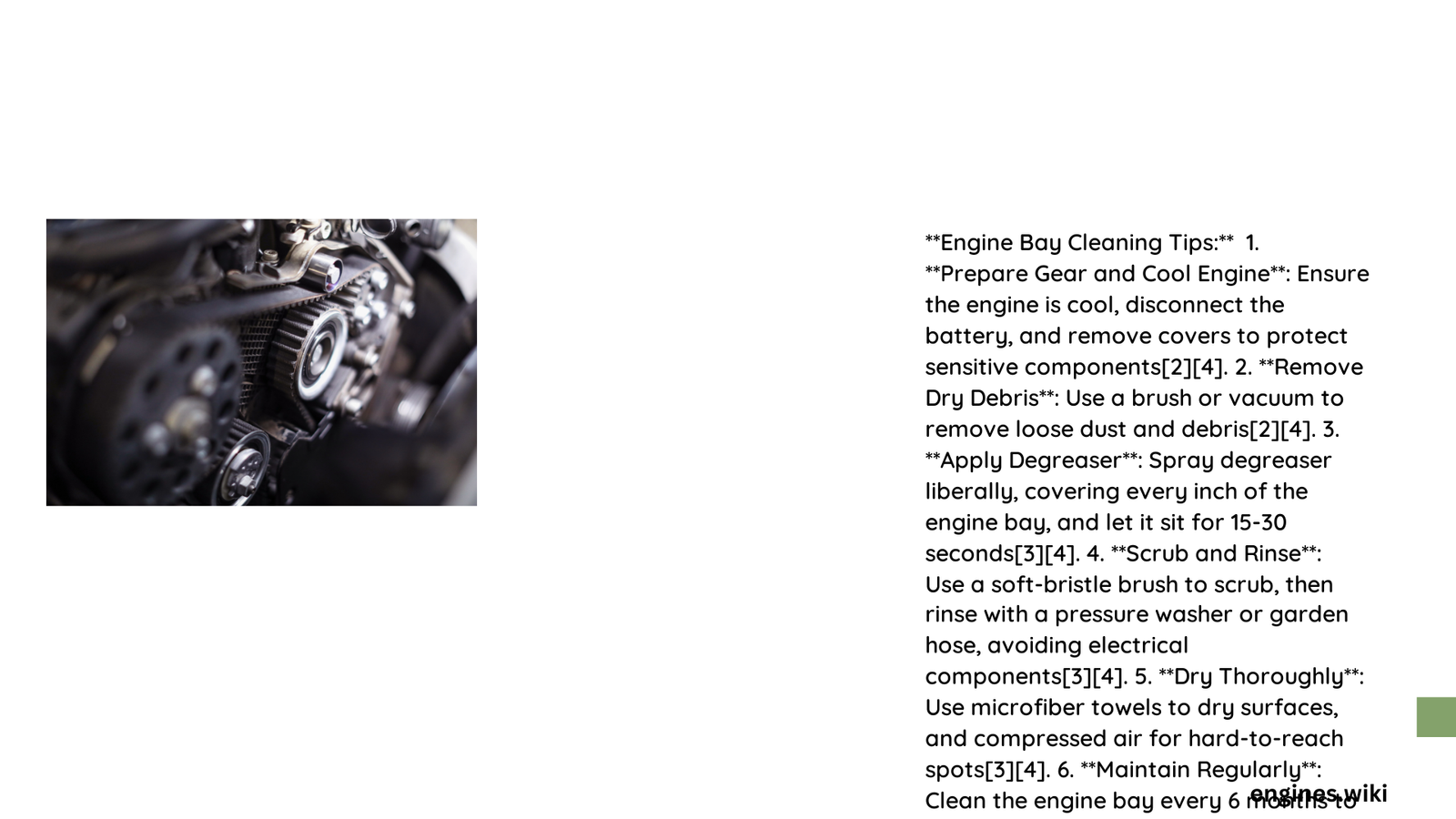Maintaining a clean engine bay is crucial for vehicle performance and longevity. Professional mechanics and automotive enthusiasts understand that regular engine compartment cleaning prevents dirt accumulation, identifies potential mechanical issues, and helps maintain optimal engine performance. This comprehensive guide provides professional-grade engine bay cleaning tips that protect sensitive components while ensuring a pristine engine compartment.
Why Clean Your Engine Bay?
Cleaning an engine bay goes beyond aesthetic appeal. Here are key reasons to maintain a clean engine compartment:
| Benefit | Description |
|---|---|
| Performance | Removes heat-trapping debris |
| Early Problem Detection | Reveals potential leaks and wear |
| Corrosion Prevention | Eliminates moisture and contaminants |
| Resale Value | Demonstrates meticulous vehicle maintenance |
What Preparation Do You Need?

Essential Cleaning Supplies
- Degreaser (engine-specific)
- Soft-bristle brushes
- Microfiber towels
- Plastic bags
- Compressed air
- Trim restorer
Safety Precautions
- Work in a well-ventilated area
- Ensure engine is completely cool
- Disconnect battery negative terminal
- Cover electrical components
How to Clean Your Engine Bay Safely?
Dry Cleaning Stage
- Use compressed air or vacuum to remove loose debris
- Brush away dust and dirt from hard-to-reach areas
- Remove large debris manually
Wet Cleaning Process
- Dilute degreaser (1:3 ratio with water)
- Cover sensitive electrical components
- Apply degreaser strategically
- Use soft brushes for gentle scrubbing
- Rinse with low-pressure water
- Dry thoroughly with microfiber towels
What Products Should You Use?
Recommended Degreasers
- Zep Industrial Purple Cleaner
- Chemical Guys All Clean+ Degreaser
- Simple Green Automotive Cleaner
Avoid These Products
- Dish soap
- WD-40
- High-pressure washers
- Harsh chemical cleaners
Pro Tips for Engine Bay Maintenance
- Clean engine bay every 6-12 months
- Use trim restorer on plastic components
- Inspect for potential leaks during cleaning
- Apply light protective coating after cleaning
- Use compressed air for hard-to-reach areas
Common Mistakes to Avoid
- Cleaning a hot engine
- Using excessive water pressure
- Neglecting electrical component protection
- Skipping thorough drying process
- Using inappropriate cleaning chemicals
Cost-Effective Cleaning Strategy
| Product | Average Cost | Frequency of Use |
|---|---|---|
| Degreaser | $10-$20 | Every 6-12 months |
| Microfiber Towels | $15/pack | Multiple uses |
| Soft Brushes | $10/set | Long-term use |
Final Recommendations
Professional engine bay cleaning requires patience, proper tools, and systematic approach. Regular maintenance prevents long-term damage and maintains vehicle performance. Always prioritize safety and use manufacturer-recommended techniques.
Pro Tip: Take before and after photos to track your engine bay’s condition and cleaning effectiveness.
